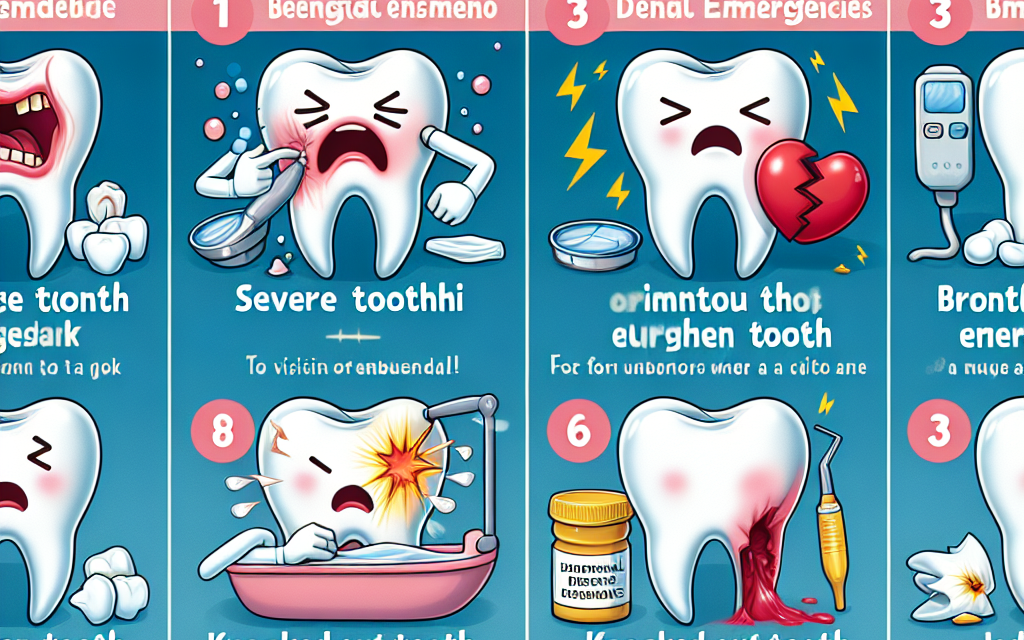Navigating Dental Emergencies in Bendigo: When to Visit the Hospital
Dental emergencies can be distressing and painful, often requiring immediate attention. In Bendigo, a city known for its rich history and vibrant community, understanding how to navigate dental emergencies is crucial for residents. This article will explore the various types of dental emergencies, when to seek hospital care, and the resources available in Bendigo for effective management of these situations.
Understanding Dental Emergencies
Dental emergencies encompass a wide range of issues that can arise suddenly and require immediate care. These emergencies can be categorized into several types, including traumatic injuries, severe pain, infections, and complications from existing dental conditions. Recognizing the signs and symptoms of a dental emergency is the first step in determining the appropriate course of action.
Types of Dental Emergencies
Dental emergencies can be broadly classified into the following categories:
- Traumatic Injuries: These include broken, chipped, or knocked-out teeth resulting from accidents or sports injuries.
- Severe Pain: Intense toothaches or pain that may indicate underlying issues such as cavities, abscesses, or gum disease.
- Infections: Dental infections can lead to swelling, fever, and severe discomfort, necessitating immediate care.
- Complications from Existing Conditions: Issues arising from previous dental work, such as lost fillings or crowns, can also be considered emergencies.
- Orthodontic Emergencies: Problems with braces or other orthodontic appliances that cause pain or discomfort.
Each type of emergency requires a different approach and understanding when to seek help is vital for effective treatment.
When to Visit the Hospital
While many dental emergencies can be managed by a dentist, certain situations warrant a visit to the hospital. Understanding these scenarios can help individuals make informed decisions during stressful times.
Signs That Require Hospital Care
There are specific indicators that suggest a dental emergency may require hospital intervention:
- Severe Facial Swelling: If swelling extends beyond the mouth and jaw, it may indicate a serious infection that requires intravenous antibiotics.
- Difficulty Breathing or Swallowing: These symptoms can signal anaphylaxis or severe infections that obstruct the airway.
- Uncontrolled Bleeding: If bleeding from the mouth does not stop after 10 minutes of applying pressure, immediate medical attention is necessary.
- High Fever: A fever accompanying dental pain may indicate an infection that has spread beyond the dental area.
- Severe Pain Not Relieved by Over-the-Counter Medications: If pain persists despite taking pain relievers, it may require stronger medications or surgical intervention.
In these cases, visiting the hospital can provide the necessary resources and expertise to address the issue effectively.
Common Dental Emergencies in Bendigo
Bendigo residents may encounter various dental emergencies. Understanding these common issues can help individuals prepare and respond appropriately when they arise.
1. Knocked-Out Teeth
One of the most alarming dental emergencies is a knocked-out tooth. This situation often occurs during sports activities or accidents. If a tooth is knocked out, it is crucial to act quickly:
- Handle the Tooth Carefully: Only touch the crown of the tooth, avoiding the root to prevent damage to the periodontal ligaments.
- Rinse Gently: If the tooth is dirty, rinse it gently with water. Do not scrub or use soap.
- Reinsert if Possible: If the person is conscious and able, try to reinsert the tooth into the socket. If not, place it in a container of milk or saline solution.
- Seek Immediate Dental Care: Time is of the essence; ideally, the tooth should be reinserted within 30 minutes for the best chance of saving it.
In Bendigo, local dental clinics are equipped to handle such emergencies, but if after-hours care is needed, visiting the hospital may be necessary.
2. Severe Toothache
A severe toothache can be debilitating and may indicate an underlying issue such as an abscess or cavity. Here’s how to manage this situation:
- Identify the Cause: Try to pinpoint the source of the pain. Is it localized or widespread? Is there swelling or sensitivity to hot or cold?
- Over-the-Counter Pain Relief: Non-prescription pain relievers like ibuprofen or acetaminophen can help alleviate discomfort temporarily.
- Cold Compress: Applying a cold compress to the outside of the cheek can reduce swelling and numb the area.
- Seek Dental Care: If the pain persists, it’s essential to see a dentist as soon as possible. If accompanied by fever or swelling, consider visiting the hospital.
In Bendigo, dental clinics often offer emergency appointments for severe pain, ensuring timely treatment.
3. Dental Infections
Dental infections can escalate quickly and lead to serious health complications. Recognizing the signs of an infection is crucial:
- Symptoms: Look for signs such as swelling, redness, fever, and pus discharge. These indicate an infection that may require antibiotics.
- Immediate Care: If you suspect an infection, seek dental care immediately. If you experience difficulty breathing or swallowing, go to the hospital.
- Follow-Up Treatment: After initial treatment, follow up with your dentist to ensure the infection is fully resolved.
In Bendigo, dental professionals are trained to manage infections effectively, often providing antibiotics and drainage if necessary.
4. Broken or Chipped Teeth
Accidents can lead to broken or chipped teeth, which can be both painful and aesthetically concerning. Here’s how to handle this situation:
- Assess the Damage: Determine if the break is minor or severe. Minor chips may not require immediate care, while significant breaks may expose nerves.
- Control Pain and Bleeding: Use a cold compress to manage pain and swelling. If there’s bleeding, apply gentle pressure with a clean cloth.
- Visit a Dentist: Schedule an appointment with a dentist as soon as possible. They can assess the damage and recommend treatment options such as bonding or crowns.
In Bendigo, many dental clinics offer emergency services for broken teeth, ensuring prompt care to prevent further complications.
5. Orthodontic Emergencies
For individuals with braces or other orthodontic appliances, emergencies can arise that require immediate attention:
- Loose Brackets or Wires: If a bracket becomes loose or a wire pokes the cheek, it can cause discomfort. Use orthodontic wax to cover sharp edges until you can see your orthodontist.
- Severe Pain: If pain persists after adjusting braces, consult your orthodontist. In some cases, pain may indicate a more serious issue.
- Emergency Visits: Many orthodontists in Bendigo offer emergency appointments for urgent issues, ensuring that patients receive timely care.
Understanding how to manage orthodontic emergencies can help prevent further complications and discomfort.
Resources for Dental Emergencies in Bendigo
Bendigo offers various resources for residents facing dental emergencies. Knowing where to go for help can make a significant difference in outcomes.
Local Dental Clinics
Bendigo is home to several dental clinics that provide emergency services. Some notable clinics include:
- Bendigo Dental Care: Offers a range of services, including emergency dental care, with a focus on patient comfort and care.
- Bendigo Family Dental: Provides emergency appointments and is known for its compassionate approach to dental care.
- Bendigo Dental Group: Offers comprehensive dental services, including emergency care for traumatic injuries and severe pain.
These clinics often have flexible hours and can accommodate urgent cases, ensuring that residents receive timely care.
Hospital Emergency Departments
In cases where dental emergencies escalate beyond the scope of dental clinics, Bendigo Health provides emergency services. The hospital’s emergency department is equipped to handle severe cases, including:
- Facial Swelling and Infections: Patients experiencing severe swelling or infections can receive intravenous antibiotics and pain management.
- Trauma Cases: Injuries resulting from accidents that affect the mouth and jaw can be treated in the emergency department.
- Referral to Specialists: If necessary, the hospital can refer patients to dental specialists for further treatment.
Understanding when to visit the hospital can ensure that patients receive the appropriate level of care for their dental emergencies.
After-Hours Dental Services
For dental emergencies that occur outside regular business hours, Bendigo offers after-hours dental services. These services are crucial for individuals who experience emergencies during evenings or weekends. Some options include:
- Emergency Dental Clinics: Some clinics in Bendigo provide after-hours services specifically for dental emergencies.
- Hotlines: Dental hotlines can offer advice on managing dental emergencies and direct patients to available services.
- Local Hospitals: As mentioned earlier, Bendigo Health’s emergency department is available 24/7 for urgent cases.
Having access to after-hours services can alleviate stress and ensure that individuals receive timely care when they need it most.
Preventive Measures and Education
Preventing dental emergencies is always preferable to managing them. Education and awareness can significantly reduce the likelihood of experiencing a dental emergency. Here are some preventive measures:
- Regular Dental Check-Ups: Routine visits to the dentist can help identify potential issues before they escalate into emergencies.
- Protective Gear: Wearing mouthguards during sports activities can prevent traumatic injuries to the teeth.
- Good Oral Hygiene: Maintaining proper oral hygiene can prevent cavities and gum disease, reducing the risk of emergencies.
- Awareness of Symptoms: Educating oneself about the signs of dental issues can lead to early intervention and treatment.
By taking proactive steps, individuals can minimize their risk of dental emergencies and maintain better oral health.
Conclusion
Navigating dental emergencies in Bendigo requires knowledge and preparedness. Understanding the types of emergencies, recognizing when to seek hospital care, and knowing the available resources can significantly impact outcomes. Whether it’s a knocked-out tooth, severe pain, or an infection, timely intervention is crucial for effective treatment.
Residents of Bendigo are fortunate to have access to various dental clinics and hospital services that cater to emergency situations. By prioritizing preventive measures and staying informed, individuals can reduce their risk of dental emergencies and ensure that they are well-equipped to handle any situation that arises.
In summary, being proactive about dental health, knowing when to seek help, and utilizing local resources can make all the difference in managing dental emergencies effectively. Stay informed, stay prepared, and prioritize your dental health for a brighter, healthier smile.





